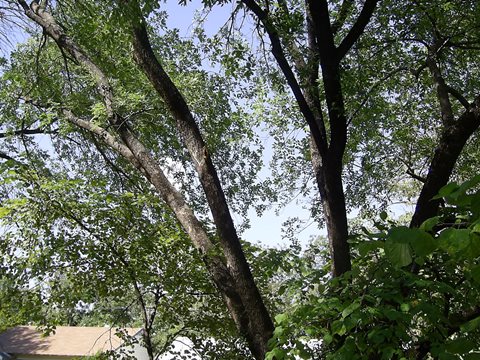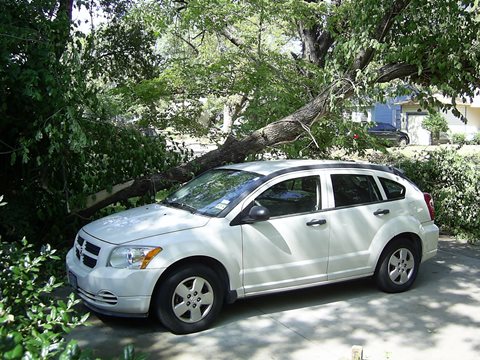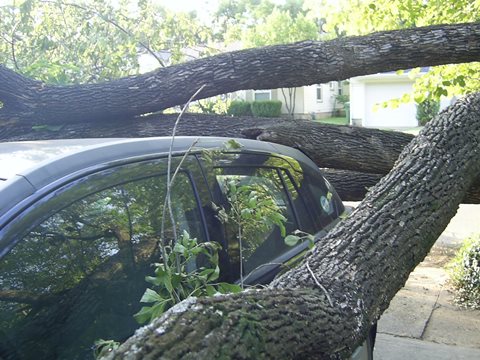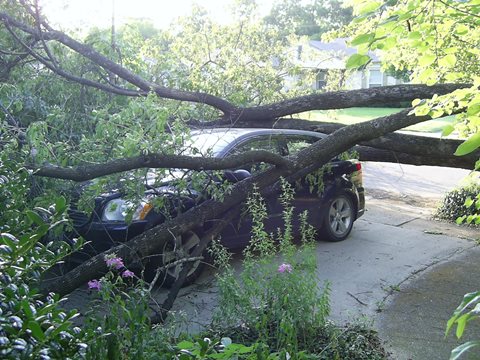 View From My Back Steps
View From My Back Steps
By
John I. Blair
The Night The Tree Fell
When we bought our house in the mid-1980s it came with a rather bare yard as the previous owners obviously weren’t gardeners. However, there was a pair of mature ash trees in front that even 30 years ago provided a lot of welcome shade in hot Texas summers. These had been part of what was once a continuous double row of ash trees on both sides of the street on this block, evidently planted when the houses were built 60 years ago. Ash trees, like American elms, were once a prominent part of the urban landscape in America – attractive trees everyone planted for quick shade. But as with elms (wiped out by the millions in the 20th century by Dutch Elm Disease), with ash trees it turned out there were problems. Despite ash wood being known for its strength (used to make baseball bats) older ash trees are very prone to heartwood rot and in recent years to attacks by borers. Even when we first moved here, many of the original trees were gone and many more were dying.
The loss of these ash trees in the neighborhood was obvious – every year another would bite the dust and have to be removed. Most recently a big specimen just a few feet west of my driveway finished slowly expiring and was carefully (and expensively) removed down to a low stump.
The Ash Tree Before Storm
Then, just four years ago, the ash tree near the house and next to my driveway dropped a huge limb onto my parked car while I was standing with a friend just inside my open-door garage, seeking shelter from a sudden squall line. Amazingly, the car only received a tiny dent. When I paid a tree service company to remove the fallen limb they warned me that both my ash trees had rotten cores and should be removed ASAP before something worse happened. As the cost was high, and because I loved their green foliage and deep shade, I decided to risk it and let them stand.
And then came the call in the night.
About a month ago my phone rang at 4:15 a.m. It was my neighbor from across the street. And he told me that my other ash tree had lost a huge section in a freak wind storm just a few minutes earlier. He didn’t want me dropping of heart failure after walking out the door in the morning and seeing that. So we investigated the situation as well as possible with flashlights, couldn’t really tell what if any damage had been done to my parked car, and returned to bed to await the dawn.
This shows my 2007 Caliber with one limb across its roof;looked bad; nodamage to car.
In the clear light of day I could see that this time the car had suffered real damage. And sure enough, the insurance inspector declared it totaled. That was followed by a day of skilled work removing the portions of tree across the car, then another day removing both ash trees to low stumps.
My 2011 Caliber with massive multiple limbs across the car.
Any major change in the environment such as this has repercussions for years afterward. And they started immediately. My previous areas of shade garden and part-shade garden are now in full, blasting sunshine most of the day. Horse herb and ajuga wilt fast; the verdict isn’t in yet on the other plants. My poor dogwood tree – the gem of my front yard – was badly injured by the falling limb and now is no longer sheltered under a tall shade tree – the natural environment for dogwoods. Only time will tell whether it recovers or even survives.
Another view of limbs across the car that did enough damage to total it.
On the bright side, I had heeded the warning four years ago to one degree – although I hadn’t removed the ash trees, I had encouraged several volunteer red oaks to grow in spots where they might eventually take over as the “climax” trees that oaks have evolved to be – the trees that are still there when a forest has fully matured. And now their turn has come. A healthy red oak in good soil with sufficient water can grow two feet a year – sometimes even faster. Some of these are already more than eight feet tall and they got almost no damage from the falling ash tree sections. So rather than mourning my ash trees, I have chosen to celebrate the futures of my oak trees – a natural succession of species that has just been speeded up a bit by this arboreal catastrophe. I’ll remember my ash trees; I’ll water my oak trees.
Later Note: I am actually watering the oak trees this afternoon in fact. And the largest of them are 12 feet tall already. A similar tree on the opposite side of the yard grew from an acorn 30 years ago to a beautiful, well-proportioned tree at least 60 feet tall at present. It’s on the line between my yard and my neighbor’s yard and I think we both claim it – half to each of us! I don’t know how much space you can allow for photos, but I could certainly provide a couple of the fallen tree and a couple of the new oaks.
Click on author's byline for bio and list of other works published by Pencil Stubs Online.
| 






